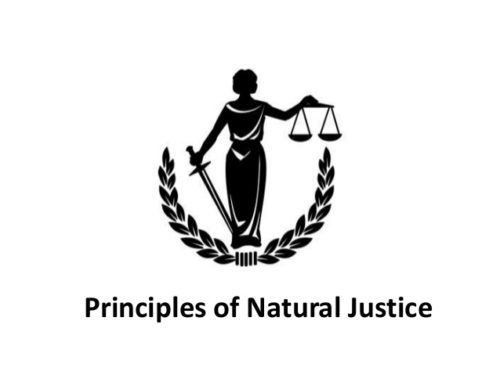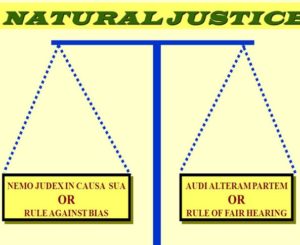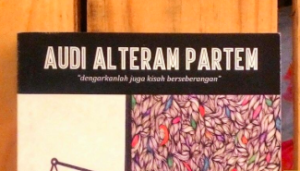Principles Of Natural Justice
Introduction to Principles Of Natural Justice
“Natural Justice” is an expression of English common law which signifies certain fundamental rules of judicial procedure. The Principles Of Natural Justice is those fundamental rules, the breach of which will prevent justice from being seen to be done. These rules don’t require that the proceedings of an administrative court must be conducted as in a court of law or in accordance with strict rules of evidence, but they seek to ensure that justice shall not only be done, but also be seen to be done. Rules of natural justice are not codified canons. The rules of natural justice differs with each case and the attitude of the judge deciding the case. The aim of these rules is to secure justice and to prevent miscarriage of justice. They provide minimum protection to the rights of individuals against the arbitrary procedure that may be adopted by the judicial or quasi-judicial authority while making an order affecting those rights.
Natural justice differs from legal justice. Natural justice is justice in deed and truth while legal justice is justice declared and recognized by law and enforced by courts in accordance with the procedure established by law. Natural justice is justice based on technicalities of law following the procedure established by the Principles Of Natural Justice.

PRINCIPLES OF NATURAL JUSTICE
The Principles of Natural Justice are those rules which have been laid down by the Courts as being minimum protection of the rights of the individual against the arbitrary procedure that may be adopted by a judicial, quasi-judicial and administrative authority while making an order affecting those rights. The traditional English law recognizes two principles of natural justice-
A) NEMO JUDEX IN CAUSA SUA (Rule against bias)
The maxim ‘nemo judex in causa sua’ literally means that the man should not be the judge in his own cause i.e. the judge must be impartial. This is also known as rule against bias. The word ‘bias’ is derived from the French word ‘biais’ meaning oblique as opposed to straight. Bias may be defined as a pre-conceived opinion or a pre-disposition or pre-determination to decide a case or an issue in a particular manner does not leave the mind open conviction. It is a condition of mind which sways judgments and renders a judge unable to exercise impartially in a particular case. Bias stands included within the
attributes and broader purview of the word ‘malice’ which in common acceptation means and implies ‘spite’ or ‘ill-will’. Bias and Mala fide are different. Mala fide means ‘in bad faith’. Mala fide intention does not invalidate the judicial or quasi-judicial proceedings; only it affects the decision of the authority in any capacity. It is settled principle that any order or decision made by any public body or an inferior tribunal, suffering from the vice of mala fide would be quashed. In the rule of bias, the presiding officer is interested in the benefit of one of the party with which his own interest is attached. In the mala fide
intention, the interest primarily is of the officer exercising his power with such an intention.

TYPES OF BIAS
- PECUNIARY BIAS– Pecuniary bias arises from a monetary interest in the subject matter of dispute. The judicial approach is unanimous that any financial interest, how so ever small it may be in the subject-matter, would disqualify a person from acting as an adjudicator wherever pecuniary bias is alleged the court views it with utmost seriousness. The disqualification will not be avoided by non-participation of the biased member in the proceedings if he was present when the decision was reached.
- PERSONAL BIAS-A number of circumstances may give rise to personal bias. A judge may be relative, friend or business associate of a party. He may have some personal grudge, enmity or grievance or professional rivalry against such party. In view of these factors, there is every likelihood that the judge may be biased towards one party or prejudiced towards the other.
- BIAS AS TO SUBJECT MATTER OR OFFICIAL OR POLICY BIAS-The cases which fall under this category is where the deciding officer is directly or otherwise involved in the subject matter of the case. Bias as to subject matter may be classified under four kinds:
- PARTIALITY-To disqualifies there has to be some close and direct connection between the adjudicating authority and the issue in controversy. But mere involvement would not vitiate the administrative action unless there is a real likelihood of bias.
- DEPARTMENTAL BIAS/OFFICIAL BIAS- In proceedings before an administrative authority one of the parties is usually the administration itself, the authority may have “official bias” towards the department with which is attached or may have a “policy” bias i.e. interested in projecting and pursuing the policies of the department. Thus, departmental bias is something which is inherent in the administrative process.
- PRECONCEIVED NOTION BIAS i.e. PRIOR UTTERANCE/PREJUDGMENT OF ISSUES- Bias arising out of preconceived notions is a very delicate problem of administrative law. It is useless to accuse a public officer of bias merely because he is predisposed in favor of some policy in the public office because no judge as a human being is expected to sit as a blank sheet of paper. Thus only those prejudices which are not founded on reason and actuated by self-interest should be taken into consideration to determine the question of bias.
- ACTING UNDER DICTATION-A judge, minister or official, vested with powers to decide any issue, must exercise his own judgment and arrive at an independent decision. He cannot leave it to any other authority, and if arrives at a decision under dictation from a superior authority, the decision is not valid.
EXCEPTIONS TO THE RULE AGAINST BIAS
There are certain exceptional cases where a person is allowed to decide a case even though, but for exceptional circumstances, he would have been disqualified:
- Doctrine of Necessity or Statutory Exception- The principle of rule against bias has no application if the person who decides the matter is the only competent authority to take action in that matter.
- Waiver-It is a known fact that parties cannot by their consent, give jurisdiction to Court/tribunal, but an exception is made in case of certain grounds like bias. The Court normally insists that the objection shall be taken as soon as the party prejudiced knows the facts which entitle him to object. If, after he or his advisers become aware of the disqualification and still, they let the proceedings continue without protest, they are held
to have waived their objection and the determination cannot be challenged.
(B) AUDI-ALTERAM PARTEM (Hear the other side)
The second fundamental principle of natural justice is audi alteram partem which means ‘hear the other side’ or ‘no man should be condemned unheard’ or ‘both the sides must be heard before passing any order’.
The principle of audi alteram partem is the basic concept of principle of natural justice. It is “sine qua non” of every civilized society and means no person shall be condemned without being heard. The person must be given an opportunity to defend himself. The corollary deduced from this rule is_ “qui aliquid statuerit parte inaudita altera, aequum licet dixerit, haud aequum fecerit”. (One, who has decided anything without hearing the other party, even though he has said what is right, has done wrong). Wade and Forsyth in their book, Administrative Law, 8th edn., p 476, observed that, “the principle of audi alteram partem is more far-reaching of the principles of natural justice, since it can embrace almost every question of fair procedure or due process and its implications can be worked out in general detail.
In Union of India v. TR Verma AIR 1957 SC 882, it was observed- “Rules of natural justice require that a party should have the opportunity of adducing all relevant evidence on which he relies, that the evidence of the opponent should be taken in his presence and that he should be given the opportunity of cross examining the witnesses examined by that party and that
no materials should be relied on against him without his being given an opportunity ofexplaining them”. Three important aspect of audi alteram partem are:
That the person likely to be adversely affected or against whom an action is proposed to be taken must have notice of why and what action is proposed;
Such a person must have adequate opportunity to put forward his say as to why
such an action should not be taken and,
The authority must give reasons for the actions after considering the representation of the person likely to be affected.

Contents of Audi Alteram Partem–
- RIGHT TO NOTICE-Hearing starts with the issuance of notice to the affected party. It is the minimum essential requirement. If statute clearly for notice and it is not fulfilled then it is violation of principle of natural justice. A notice in order to be adequate must contain the following: a) Time, place and nature of hearing
b) Legal authority under which hearing is to be held, c) Statement of specific charges which the person has to meet.
In Car Sales Co-operative Society v. A.P AIR 1977 SC 2313, statute clearly provides for notice to be served before initiation of any action. It was not served. Court held it as violation of the principle of natural justice.
Notice means adequate notice i.e. mentioning time, place and name of authority taking action, grounds of action etc where notice is ambiguous, unclear and repeating the statutory language then it is not proper serving of notice. Notice must give enough time to person to represent his case properly. - RIGHT TO KNOW THE EVIDENCE AGAINST-The rule of fair hearing demands that there must be full disclosure of all evidential facts and of all documents proposed to be used against the party. It is done in order to provide an opportunity to the person concerned, to correct and contradict anything prejudicial to him.
- RIGHT TO PRESENT CASE AND EVIDENCE-The adjudicatory authority should afford reasonable opportunity to the party to present his case. This can be done through writing or orally at the discretion of the authority. In U.O.I. v. J.P. Mitter, the Court refused to quash the order of the President of India in a dispute relating to the age of a High Court judge on the ground that the President did not grant oral hearing even on
request. - DISCLOSURE OF ALL EVIDENCE/MATERIALS-The adjudicating authority must disclose all material placed before it in the course of the proceedings and cannot utilize any material unless the opportunity is given to the party against whom it is sought to be utilized.
- RIGHT TO REBUT ADVERSE EVIDENCE-The opportunity to rebut evidence necessarily involves a right to cross examination and right to legal representation.
- CROSS EXAMINATION– Cross examination is a most important weapon to establish truth, the Court do not insist on cross-examination in administrative adjudication unless the circumstances are such that in absence of it, the person cannot put up an effective defense. The right to cross-examination as an ingredient of fair hearing was considered by Supreme Court in State of J&K v. Bakshi Ghulam Mohd. In this case, an inquiry was instituted against Bakshi, former C.M. of J&K. The request of Bakshi to crossexamine witness who had filed affidavits against him was denied. The decision of the Commission was challenged on the ground that the denial of opportunity to cross-examine witnesses violates the rule of fair hearing. The Supreme Court, in this case, disallowed the challenge to the decision of Commission. It held that there was no violation of fair hearing as the evidence of the witness was made available to the challenging party in the form of affidavits.
- LEGAL REPRESENTATION– In administrative proceedings, representation through the lawyer is not considered indispensable part of natural justice as oral hearing is not included in the meaning of the fair hearing. The denial of legal representation is justified on grounds-
(a) Lawyers tend to complicate matters, prolong the proceedings and destroy the essential informality of the proceedings.
(b) This would give an edge to rich over the poor who cannot afford good lawyers. But to what extent legal representation is allowable in administrative proceedings depends on provisions of both the statute. In Nandini Satpathy v. P.L. Dani AIR 1978 SC 1025, case the Court held that the accused must be allowed legal representation during custodial interrogation and the police must wait for a reasonable time for the arrival of a
lawyer. In the area of Criminal Justice the Cr.P.C. now provides the legal aid to the accused. - RIGHT TO THE ENQUIRY REPORT– In administrative matters, it happens that the inquiry is entrusted to someone else and on the report of the enquiry the action is taken by the Competent Authority. In these cases it is essential to supply the copy of report to the charged employee, before final decision is taken by the Competent Authority. If it is not done, it is held as the violation of principles of natural justice. In Union of India v. E. Bashyan AIR 1988 2 SCC 196, a two judge Bench of the Supreme Court held that failure to supply the inquiry report to the delinquent before the disciplinary authority took a final decision would constitute a violation of the principle of natural justice.
- RIGHT OF HEARING
(1)PRE-DECISIONAL HEARING- A pre-decisional hearing is to be given to the affected parties as a matter of rule. But, where in a given case prior hearing is not possible, as it would frustrate the object and purpose of the exercise of power, it can be dispensed with, but it must be followed by post-decisional hearing.
(2)POST-DECISIONAL HEARING- A hearing given by the authority, after taking a decision or making an order is known as post-decisional hearing. According to De Smith, a prior hearing may be better than a subsequent hearing but a subsequent hearing is better than no hearing at all. The idea of post-decisional hearing has been developed to maintain a balance between administrative efficiency and fairness to the
individual. In Swadeshi Cotton Mills v. Union Of India7, the Apex Court made it clear that where the pre-decisional hearing is dispensed with, a provision for the post-decisional hearing will be necessary.
EXCEPTIONS TO THE RULE OF NATURAL JUSTICE
- Exclusion in the emergency– In case of the emergency where the prompt action (preventive or remedial) is needed, the requirement of notice and hearing may be obviated. Exclusion in case of confidentiality- In Malak Singh v. the State of Punjab, the Supreme Court held that the maintenance of surveillance register by the police is a confidential document so no person can have access to it. Exclusion in case of administrative matters- A student of university was removed from the rolls for unsatisfactory academic performance without being given any predecisional hearing. (J.N.U. v B.S. Narwal) The Supreme Court held that if the competent academic authorities examine and assess the work of student over a period of time and declare his work unsatisfactory, the rules of natural justice may be excluded.
- Exclusion based on Impracticability-In R. Radhakrishnan v. Osmania University, the Court sanctified the exclusion of the rules of natural justice on the ground of administrative impracticability. The Court held that notice and hearing to all candidates is not possible in this case.
Written by:

Sanah Sethi is a final year law student at Amity Law School, having interest in corporate laws.

Hi. I see that you don’t update your blog too often. I know that writing content is time
consuming and boring. But did you know that there is a tool that
allows you to create new articles using existing content (from article directories
or other websites from your niche)? And it does it very well.
The new posts are unique and pass the copyscape test.
Search in google and try: miftolo’s tools
Wow! This blog looks just like my old one! It’s on a completely different subject but it has pretty much the same layout and design. Wonderful choice of colors!